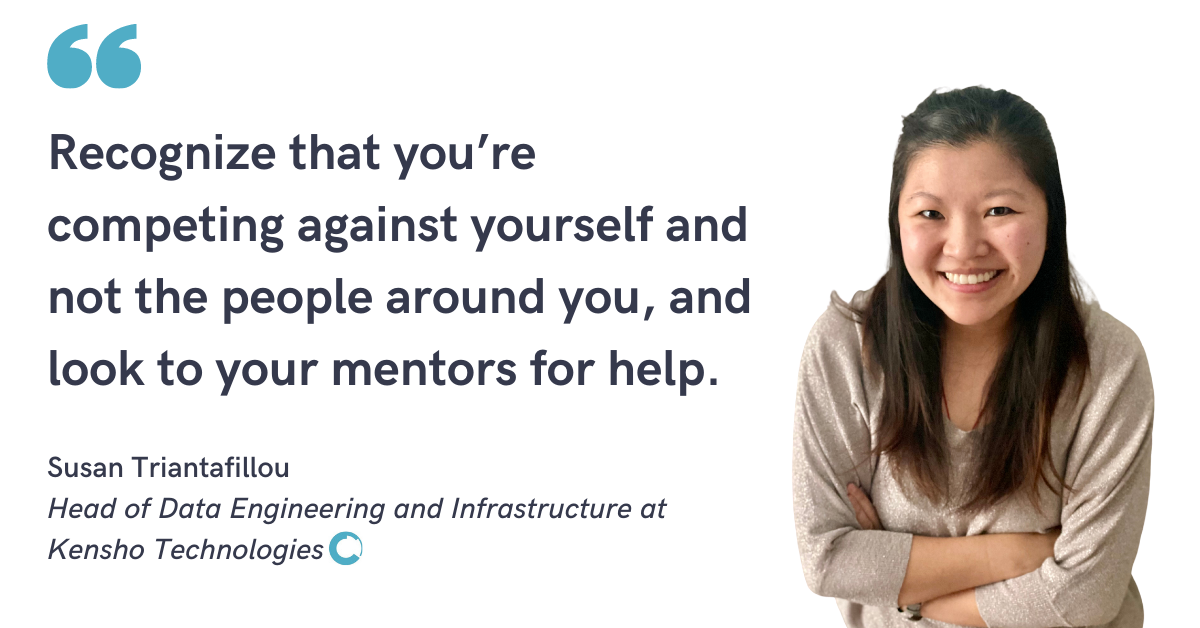When Susan Triantafillou, Head of Data Engineering and Infrastructure at fintech company Kensho Technologies, finds herself contemplating whether or not a risk is worth taking, she always asks herself one question: "If I turn this down, will I look back on this moment five years from now and regret it?"
That was the question she asked herself in 2014 when faced, just one year into her career, with the opportunity to leave a very stable job as a software engineer and join data analysis startup Visallo as a founding member.
The answer was a resounding yes, so she quit her job to pursue the risks—and rewards—of startup life. Chief among them was the opportunity to test and grow her leadership skills. "As a software engineer, I was usually coding most of the time, but at Visallo, I had a much wider variety of responsibilities, including working with clients, contributing on the business side, and working with product development," Susan explains.
After nearly four years at Visallo, the company was acquired by Kensho, and Susan quickly took on even more significant leadership challenges; she advanced from an initial role as a software engineer to Head of Visallo Engineering, then to Head of Data Engineering and Infrastructure, all within two years.
We sat down with Susan to learn how her leadership style has changed and grown over time, how she identifies and leans into her strengths, and what advice she has for other women growing their careers.
Finding her own leadership style: balancing flexibility and a growth mindset
Susan's appetite for risk and new challenges has provided her with ample opportunities to test and develop her leadership style, finding an approach that is both effective and authentic to her.
"I've learned that it's a balancing act. I always want to be understanding, and I certainly want to be flexible whenever it's appropriate," says Susan. "I've learned to embrace those strengths especially while having hard conversations."
Overall, Susan's ability to put herself in her team members' shoes has served her well. When she became the Head of Data Engineering and Infrastructure at Kensho, she knew she needed to get to know the members of her new team. She began with asking lots of questions.
"I started with technical questions," she explains, "but I also asked them about their expectations of me. What everybody expects and needs from a leader is different, and understanding that up front was really helpful in structuring the role."
She recognized that her team needed two things: flexibility and a growth mindset. Both of those are core to Susan's leadership philosophy, so she was in a good position to make an impact.
"I want to help lay the foundation for success while giving people on the team the flexibility to use their unique skills to achieve our goals," says Susan. "Kensho really believes that an innovation mindset stems from embracing your mistakes and evolving from them. It's not a blame game."
That approach structures how Susan manages on a day-to-day basis, from how she encourages question-asking in group meetings to how she leads empathetic post-mortems focused on growing together. "I like to provide constructive criticism, because I think that that's how you help people grow," she says.
Susan stresses that she's able to provide that criticism because as a leader, she begins her interactions with a sense of mutual respect; she doesn't think that empathy and criticism are mutually exclusive, but rather, two key ingredients to helping others grow as much as possible. "I would say a lot of my leadership style probably stems from my ethnic background. In Taiwanese culture respect is embedded at the core. I respect my team's time, effort, dedication, and style to help achieve their goals. I respect their experience and their skills. It's a lot more efficient to gain their trust and respect, and then once everybody's on the same page, we can sprint rather than walk towards our goals."
3 key tips to advance your career as a woman in leadership
When Kensho acquired the company Susan was working for previously, she says that it was a smooth transition. "The team's flexibility and talent made it easy to get everybody up to speed very quickly," she remembers. "I have to credit Kensho's culture and values for that."
One of the things that Susan says she likes best about Kensho and its values is their focus on curiosity and learning. "We have 'knowledge days' where we don't work on our day-to-day jobs," she says. "You take that day to actually learn. And I think that's key for innovation, it's key in terms of employee growth, and it's key in terms for company growth as well."
That commitment to growth underlies three key pieces of advice that Susan would recommend for anyone looking to step up and manage bigger teams and departments:
1. Constantly be learning. That means approaching new problems and new areas with humility as you get up to speed, while trusting—and being confident—that you'll get there eventually. "My mind typically leaps to how I can do better next time, which is great for pushing myself to the next level, but not always great for building confidence, so I've been working on that," Susan explains.
2. Find mentors everywhere. "Understand that you can learn from anyone and everyone, regardless of their background or how much experience they have," says Susan. "Recognize that you're competing against yourself and not the people around you, and look to your mentors for help."
3. Embrace change and the unknown. Susan says that she owes her career to a willingness to take risks. "I left a stable job to go join a company without knowing if it would even exist in a year or two," she says. "You need to seize the opportunity when it's given to you."
If you're interested in working with Susan at Kensho, check out their open roles here.




